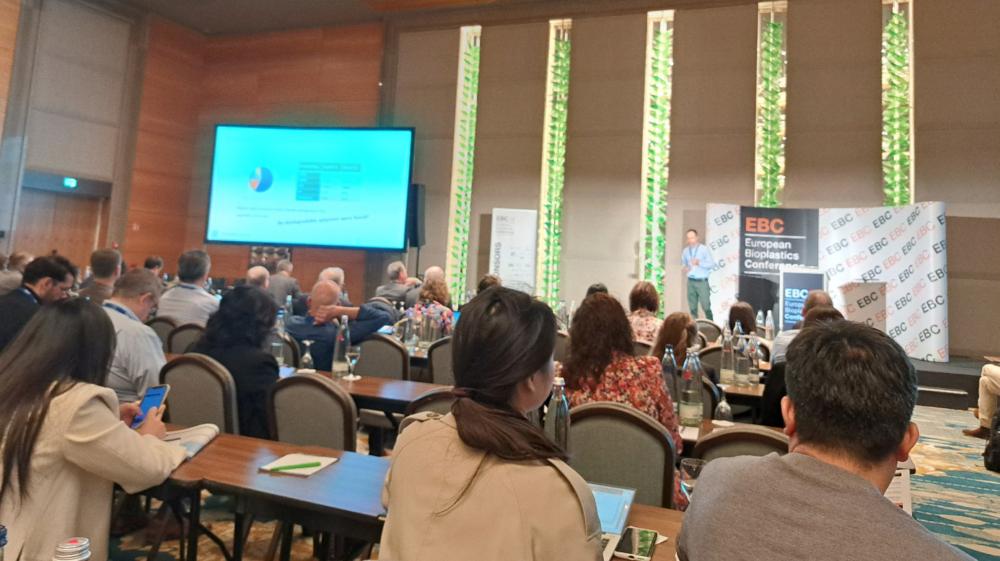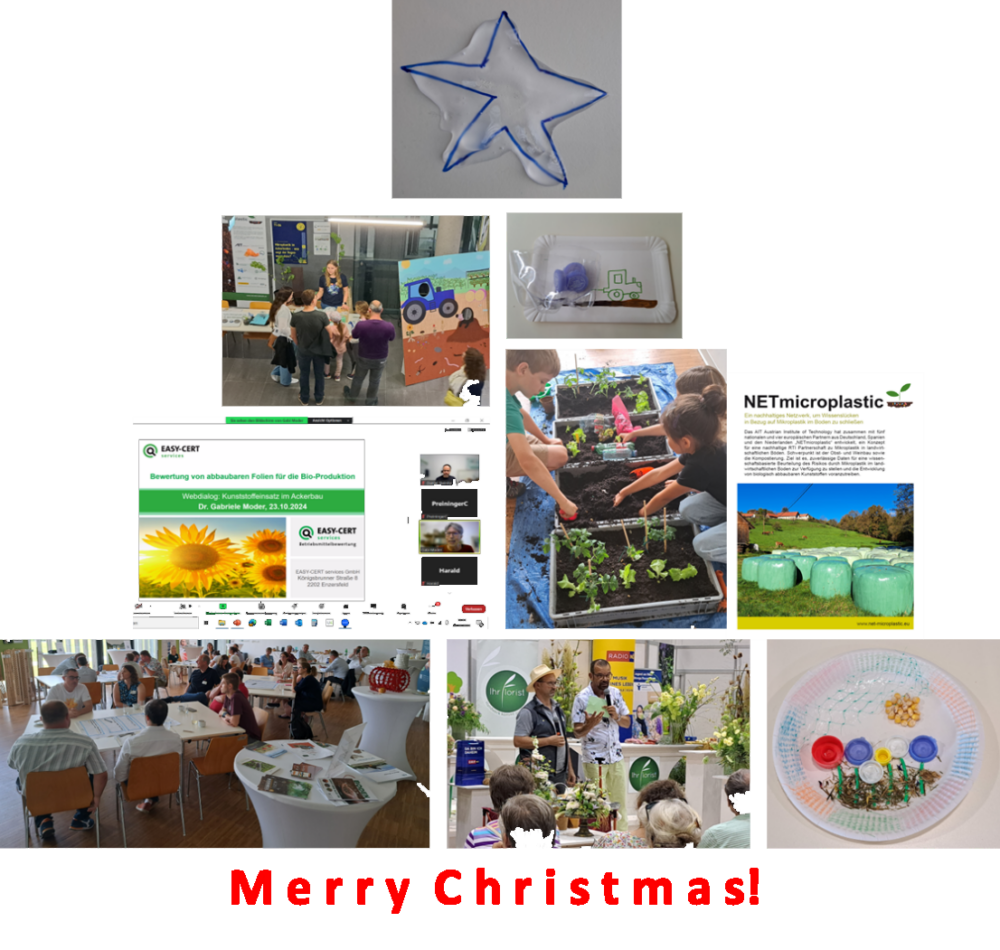Newsletter no. 8
reports on our webinar on the use of plastics in arable farming, including an interview with Markus Hillebrand on the use and experience of biodegradable mulch film in lettuce production. We report from our NETmicroplastic meeting in Vienna, where we discussed next year’s final conference, upcoming project calls and a possible continuation of NETmicroplastic beyond the end of the project. We will also be reporting on the European Bioplastics Conference (EBC), where biodegradable and compostable plastics were among the key topics. Finally, we look back at our achievements this year and look forward to 2025, our final project year.
Webinar: Plastic use in arable farming
On 23 October, 2024 NETmicroplastic hosted a webinar on the use of plastic products in arable farming organized by Bündnis Mikroplastikfrei. The webinar aimed to bring together stakeholders from politics, education, administration and research and development with participants and users from the agricultural sector in order to promote innovative technological solutions and support political decision-making in the fight against plastic pollution in soils. To this end, we had two presentations followed by a lively discussion, the first on the evaluation of degradable materials in organic farming by Gabriele Moder (Easy-Cert) and the second a practical report on the use of degradable mulch films by Markus Hillebrand (LV Styria). Gabriele Moder highlighted the objectives of organic production and the legal basis for evaluation, the certification of products that are biodegradable in soil or compostable, such as mulch film, and the inclusion of some organic products (but not degradable mulch film) in the Austrian online Easy-Cert search tool https://www.betriebsmittelbewertung.at/bio-betriebsmittel/suche. An international product search is available at https://www.inputs.eu/input-search.html.
Interview with Markus Hillebrand, Chairman of the Grazer Krauthäuptel Region
To learn more about farmers’ experiences with biodegradable mulch film, we interviewed Markus Hillebrand after the webinar.
Why and how did you start working with biodegradable film in lettuce production?
MH: It all started 20 years ago. We were using PE film. After the harvest, it was a lot of work to remove the PE film from the ground. The effort and cost of labour increased as the farm grew. At the same time, biodegradable film became cheaper and so we started using biodegradable films.
Are you now ordering biodegradable film in bulk? I think this is only possible if other farmers follow suit. Have other farmers joined in and if so, how did it start? Were they convinced from the start?
MH: We were just a few farmers and we started within the Grazer Krauthäupelverein, of which I am the chairman, and now we also collect orders through the horticultural department of the Styrian provincial government Organisation | LK Steiermark.
In the webinar you said that you have tried out different types of film. What were the reasons for switching to other films? Quality? The price?
MH: We always try to get the best price. Sometimes the quality of the films changed or the films were not available. We started with films from Italy, France, then Germany, we had Carinthia and we actually order from France. We are flexible.
Are biodegradable films different from conventional films in terms of how they are used and how they are handled?
MH: In principle, no, the same machines can be used. The Hortec works (in my opinion) a little more precisely than the Ferrari, but both are suitable for applying our 15 µm films. After harvesting, we use a grubber to shred the film and bury it under the ground.
Do you know other farmers who use biodegradable film for other types of vegetables?
MH: We are currently using 300 rolls of 1.40 cm wide by 1500 m long film for lettuce, and others of about 1 m width for tunnel crops and zucchini. Twelve farms have already ordered biodegradable film for 2025 through the horticultural department.
In Tyrol, lettuce growers can also order through the agricultural chamber Tiroler Gemüsebau | Landwirtschaftskammer Tirol.
NETmicroplastic consortium meeting in Vienna
On 27 November, 2024 Bündnis Mikroplastikfrei, Aimplas, Wassercluster Lunz, Umweltbundesamt and AIT met in Vienna at the premises of Bündnis Mikroplastikfrei, who kindly hosted the meeting, to discuss joint publications, the final event in 2025 and upcoming project calls in Cluster 6 and CBE.
It was agreed that the final event will take place in Tulln in autumn 2025 as part of a microplastics conference linking biodegradable polymer innovations with demonstration and impact studies in soil.
Conference Report
The European Bioplastics Conference (EBC) 2024 took place on the 10th and 11th of December in Berlin with 351 participants from 21 countries, including 182 companies, and NETmicroplastic was there with a poster about its goals and achievements. The EBC, organised by our NETmicroplastic partner European Bioplastics e.V., is Europe’s leading business and discussion forum within the global bioplastics sector. It provides an opportunity to network with key decision makers from across the bioplastics value chain, as well as policy makers, leading research institutes, NGOs and brand owners. Indeed, the conference programme covered the latest developments in bio-based and biodegradable materials and applications, bioplastics processing, end-of-life, sustainability and policy. While the main focus was on packaging, several interesting presentations covered agricultural applications, such as the biodegradability of mulch films, both in terms of developing such biodegradable films and demonstrating their performance in field trials.
Theodora Nikolakopoulou, Policy Officer at the European Commission’s DG GROW, gave a keynote presentation on biodegradable polymers in the context of the EU Fertiliser Regulation. This applies to EU fertiliser products with a CE mark, which allow free movement on the internal market (no registration or authorisation). By 16 July 2024, the Commission will evaluate biodegradability criteria for polymers other than nutrient polymers (polymers used as coating and wetting agents and in mulch films), and test methods to verify compliance with these criteria. The criteria, test methods and reference materials have been defined in an Aimplas study. Relevant information can be found here: Circabc; Regulation – 2019/1009 – EN – EUR-Lex; Delegated regulation – EU – 2024/2787 – EN – EUR-Lex; Delegated regulation – EU – 2024/2787 – EN – EUR-Lex.
The following session, entitled “Biodegradability explored”, saw Patrizia Pfohl (BASF) share insights into the assessment and modelling of intermediate fragmentation of biodegradable mulch film in soil. Guillaume Cazaudehore (Apesa) presented methods to evaluate the biodegradability in anaerobic digestion of home compostable bio-waste collection bags, while Daniel Steinitz (Bündnis Mikroplastikfrei) provided an overview of microplastic activities in Austria. Wouter Post (Wageningen University) presented further demonstration data resulting from an internal collaboration between Sustainable Plastics Technology and the Plant Research Group. The in-house developed industrial compostable multi-layer grow bags and support nets, which were tested in the greenhouse, demonstrated no impact on plant growth and yield. A case study on mulch films indicated no accumulation of microplastics when biodegradable plastics were used, using a model based on product functionality and mineralisation data as input.
Overall, EBC 2024 was a truly inspiring reminder of the crucial role of bioplastic innovation and the growing focus on biodegradable materials.
Season greetings & outlook 2025
In just two more weeks, 2024 will be over. It has been a year of remarkable achievements. We have published a NETmicroplastic Opinion Paper. We have implemented hands-on workshops with children in the context of the (Micro)plastic Experience Space, Tulln, and the Children’s University Tulln. We have developed a draft action plan. This plan summarises the results of our research, surveys and interviews with key stakeholders, as well as the outcome of the 2nd Stakeholder Workshop (Roadmap Consultation Workshop). It also includes the submission of a further research proposal, and the presentation of a concept for the sustainability of NETmicroplastic after the end of the project.
At the beginning of 2025, we will be at the start of our final project year with our current ambitions: We cordially invite you to our upcoming webinar on plastics use in viticulture (in German) on 29 January, and we will publish all our research data, preferably together with NETmicroplastic partners. We will also be organising a training workshop for prospective winegrowers in cooperation with HBLA Klosterneuburg, inviting primary school children from the Tulln region to our plastic space experience room, and organising the final NETmicroplastic event in Tulln as part of a microplastics conference.
It’s going to be a fantastic year – come and join us with your ambitious spirit!






